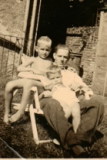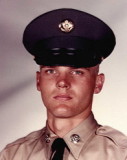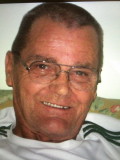Rudi Bethke Sr., a retired master blacksmith who produced parts not found in a catalog, died of cancer Feb. 1 at the Virtua Garden State Hospital in Marlton, N.J. The former Gardenville resident was 69.
During his 22 years making snowplow parts and water meter-reading devices for Baltimore City agencies, Mr. Bethke was the go-to man when a metal component broke. Newspaper articles said he could make almost anything, although the one task he did not perform was shoeing a horse.
“An imposing, broad-shouldered man,” said a 2004 Baltimore Sun article, he “saunters through the city garage like John Wayne in a cowboy movie.”
Born Rudi Wenk on a farm near Darmstadt in Germany, he made wagon wheels, farm tools and other implements as a young man. He also survived the Allies’ fire-bombing of Darmstadt on Sept. 11-12, 1944.
At age 13, he decided to make blacksmithing a career and became an apprentice.
“When I started, I worked 12-hour days, six days a week, for $7 a week, plus room and board,” he said in a 1985 Sun article.
He worked under three different blacksmiths for three years and then, after another four years of work, passed a test to become a master blacksmith.
His mother married a U.S. soldier, and the family moved to Baltimore in 1958, where he assumed his stepfather’s last name. He could not find work as a blacksmith, and became a painter and maintenance worker at Sacred Heart of Jesus parish in Highlandtown.
After he was drafted into the Army, his superiors put him to work forging parts for military vehicles. After his discharge, he worked at the Maryland Rubber Co. and installed conveyor belts.
In 1982, he returned to blacksmithing at the city’s Central Garage on Dickman Street. There he would take pieces of metal, put them in a gas-powered forge, and hammer, cut and shape them until a finished tool emerged.
According to the 2004 news article, “He has been worth his weight in tool steel, saving money by making replacement parts that keep old machines and vehicles running. Bethke, who makes $35,000 a year, also sharpens jackhammer bits, straightens tire rods and makes mounting pins for city snowplows – on the spot, if they’re needed in the middle of a storm.” City plumbers called on him to make parts for the McKeldin Fountain in the Inner Harbor.
At the time of his retirement, Mr. Bethke was one of the few municipal blacksmiths left in the country.
“He heats octagonal bars of steel in a roaring 3,000-degree gas furnace, then pounds them into shape with a hammer and anvil or a 100-year-old power hammer,” the Sun article said. “His ‘Little Giant’ power hammer looms over one corner of the shop, about as tall as the 6-foot-3 1/2 -inch Bethke.”
Mr. Bethke was not afraid of hard work.
“If he is making a tool that has to be especially hard but not so hard that it becomes brittle, Bethke dunks the hot metal in whale oil,” the 2004 article said. “Bethke stuck a chisel-in-the-making in the 25-gallon drum of black oil. ‘It’s gonna smell,’ he said. Flames licked his asbestos gloves, and the odor of car exhaust mixed with a backyard barbecue billowed up.”
When he retired in 2004 and moved to Mount Laurel, N.J., he said, “The city’s going to miss the blacksmith, I tell you that.”
A Mass was offered Tuesday at St. Joseph’s Roman Catholic Church in Fullerton.
Survivors include his wife of 47 years, the former Charlotte German; a son, Rudi Bethke Jr. of Mount Laurel, N.J.; a brother, Klaus Wenk of Baltimore; a sister, Karin Bethke of Baltimore; and two grandchildren.



